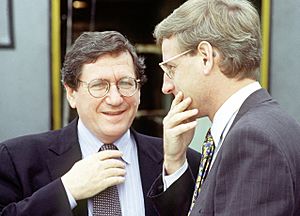Richard Holbrooke facts for kids
Quick facts for kids
Richard Holbrooke
|
|
|---|---|
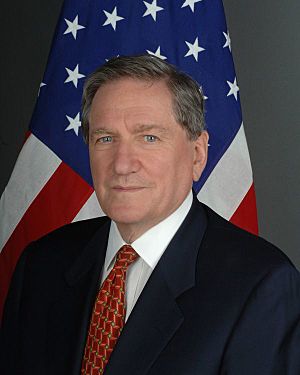 |
|
| United States Special Representative for Afghanistan and Pakistan | |
| In office January 22, 2009 – December 13, 2010 |
|
| President | Barack Obama |
| Preceded by | Position established |
| Succeeded by | Marc Grossman |
| 22nd United States Ambassador to the United Nations | |
| In office September 7, 1999 – January 20, 2001 |
|
| President | Bill Clinton |
| Preceded by | Peter Burleigh (acting) |
| Succeeded by | John Negroponte |
| Assistant Secretary of State for European and Canadian Affairs | |
| In office September 13, 1994 – February 21, 1996 |
|
| President | Bill Clinton |
| Preceded by | Stephen A. Oxman |
| Succeeded by | John C. Kornblum |
| United States Ambassador to Germany | |
| In office October 19, 1993 – September 12, 1994 |
|
| President | Bill Clinton |
| Preceded by | Robert M. Kimmitt |
| Succeeded by | Charles E. Redman |
| Assistant Secretary of State for East Asian and Pacific Affairs | |
| In office March 31, 1977 – January 20, 1981 |
|
| President | Jimmy Carter |
| Preceded by | Arthur W. Hummel Jr. |
| Succeeded by | John H. Holdridge |
| Personal details | |
| Born |
Richard Charles Albert Holbrooke
April 24, 1941 New York City, U.S. |
| Died | December 13, 2010 (aged 69) Washington, D.C., U.S. |
| Political party | Democratic |
| Spouses |
|
| Children | 2 |
| Education | Brown University (BA) |
Richard Charles Albert Holbrooke (born April 24, 1941 – died December 13, 2010) was an important American diplomat and writer. He was the only person to serve as an Assistant Secretary of State for two different parts of the world. He worked with Asia from 1977 to 1981 and with Europe from 1994 to 1996.
From 1993 to 1994, he was the U.S. Ambassador to Germany. Holbrooke became widely known in 1995. He worked with former Swedish Prime Minister Carl Bildt to help create a peace agreement in Bosnia. This led to the signing of the Dayton Peace Accords. From 1999 to 2001, Holbrooke was the U.S. Ambassador to the United Nations.
In January 2009, President Barack Obama appointed Holbrooke as a special adviser for Pakistan and Afghanistan. He worked with Secretary of State Hillary Clinton. Throughout his career, Holbrooke helped improve the lives of refugees, especially the Hmong people from Indochina. He passed away on December 13, 2010, due to a serious heart condition. Many people believed Holbrooke's work on the Dayton Accords deserved the Nobel Peace Prize.
Contents
- Early Life and Education
- A Career in Diplomacy
- Joining the Foreign Service
- Peace Corps and Foreign Policy Magazine
- Working with President Carter
- Time on Wall Street
- U.S. Ambassador to Germany
- Assistant Secretary for European Affairs
- Special Envoy to the Balkans
- U.S. Ambassador to the United Nations
- Special Representative for Afghanistan and Pakistan
- Other Activities and Interests
- Personal Life
- Death and Legacy
- Recognition
- Writings
- See also
Early Life and Education
Richard Holbrooke was born in New York City on April 24, 1941. His father, Dan Holbrooke, was a doctor, and his mother, Trudi Kearl, was a potter. His mother's family came from Hamburg, Germany, and his father's family was from Warsaw, Poland.
When Richard was 15, his father died. During his teenage years, Holbrooke spent a lot of time at the home of his friend, David Rusk. David's father, Dean Rusk, later became the Secretary of State for President Kennedy. Dean Rusk inspired Holbrooke to pursue a career in public service.
After graduating from Scarsdale High School, Holbrooke attended Brown University. He earned a Bachelor of Arts degree in history in 1962 with a full scholarship. He later studied at the Woodrow Wilson School of Public and International Affairs at Princeton University. While at Brown, Holbrooke was the Editor-in-Chief of the Brown Daily Herald newspaper.
A Career in Diplomacy
Joining the Foreign Service
Inspired by President John F. Kennedy's call for public service, Holbrooke joined the Foreign Service in 1962. This meant he would work as a diplomat for the U.S. government in other countries. He first served for six years in Vietnam. He worked as a civilian for the Agency for International Development. His job was to help with economic development and local political changes.
Holbrooke later became an assistant to important Ambassadors like Maxwell Taylor and Henry Cabot Lodge Jr.. He worked with many young diplomats who would become very important in American foreign policy later on. At 24, he joined a special team created by President Lyndon B. Johnson to advise on foreign policy.
After his time at the White House, Holbrooke worked as a special assistant to top officials in the State Department. In 1968, he joined the American team for the Paris peace talks about Vietnam. He also helped write a part of the Pentagon Papers, which was a secret report about the government's decisions during the Vietnam War.
Peace Corps and Foreign Policy Magazine
In 1970, Holbrooke became the Peace Corps Director in Morocco. The Peace Corps is a program where Americans volunteer to help people in other countries. After two years, he left the Foreign Service to become the managing editor of Foreign Policy magazine. He held this job from 1972 to 1976. During this time, the magazine published important reports on Vietnam and the Middle East.
Working with President Carter
In 1976, Holbrooke helped Jimmy Carter with his presidential campaign, focusing on national security. After Carter won, Holbrooke became the Assistant Secretary of State for East Asian and Pacific Affairs on March 31, 1977. He was the youngest person ever to hold this position. He worked as a top adviser to Secretary of State Cyrus Vance.
During his time, he helped improve relations with Cold War rivals in Asia, leading to the U.S. having normal relations with China in December 1978. He also played a big role in bringing hundreds of thousands of refugees from Indochina to the United States. This started his lifelong commitment to helping refugees.
Time on Wall Street
In 1981, Holbrooke left government work. He became a senior adviser at Lehman Brothers, a large financial company. He also co-wrote a best-selling book called Counsel to the President in 1991. He advised Al Gore and Bill Clinton during their presidential campaigns.
During these years, Holbrooke remained interested in global issues. He visited Bosnia twice in 1992 as a private citizen. He saw the terrible effects of the conflict there. This experience made him want the U.S. to take stronger action in the Balkans.
U.S. Ambassador to Germany
When Bill Clinton became President in 1993, Holbrooke was appointed Ambassador to Germany. He served during an important time, just a few years after German reunification. He helped shape the relationship between the U.S. and the new Germany. A memorable moment was President Clinton's visit to Berlin in 1994, where many Germans welcomed him.
While in Germany, Holbrooke also helped create U.S. policy to expand NATO. He also worked on the U.S. approach to the war in Bosnia. He came up with the idea for the American Academy in Berlin, a center for cultural exchange between Germans and Americans. This academy opened in 1997 and is now an important link between the two countries.
Assistant Secretary for European Affairs
In 1994, Holbrooke returned to Washington to become the Assistant Secretary for European and Eurasian Affairs. He held this job until 1996. During this time, he led the effort to expand NATO. He also led the team that worked to solve the crisis in the Balkans.
In December 1995, Holbrooke was the main person who created the Dayton Peace Accords in Paris. This agreement ended the three-and-a-half-year war in Bosnia. In 1996, he received the Manfred Wörner Medal for his important work for peace and freedom in Europe.
Special Envoy to the Balkans
After leaving the State Department, President Clinton asked Holbrooke to continue working as a special envoy to the Balkans. From 1998 to 1999, Holbrooke worked to end the conflict between Yugoslavia and the Kosovo Liberation Army (KLA) in the Kosovo War. In March 1999, he traveled to Belgrade to deliver a final warning to Yugoslav President Slobodan Milošević before NATO began its attacks.
Holbrooke wrote many articles about his experiences in the Balkans. In 1998, he published a book called To End a War. This book was about his time as the chief negotiator for the Dayton Peace Accords. The New York Times named it one of the best books of 1998.
U.S. Ambassador to the United Nations
In August 1999, Holbrooke became the 22nd U.S. Ambassador to the United Nations. He was known for being creative and for solving long-standing problems between the United States and the UN. His biggest success was negotiating a deal for the U.S. to pay its overdue fees to the UN. This deal also lowered the amount of money the U.S. had to pay to the UN in the future.
Holbrooke also achieved other important things as UN Ambassador. He got the United Nations Security Council to discuss and pass a resolution on HIV/AIDS. This was the first time this group had talked about public health as a global security issue. In January 2000, he used the U.S. presidency of the UN Security Council to highlight problems in Africa. He brought together leaders from Africa and around the world, including Nelson Mandela, to encourage more effective UN actions.
Holbrooke also helped Israel become a member of the UN's Western European and Others Group. This allowed Israel to run for leadership positions in UN groups for the first time.
GBCHealth
After leaving the UN, Holbrooke led an organization that aimed to get businesses involved in fighting AIDS. He grew this group, first called the Global Business Council on HIV/AIDS, into a worldwide organization with over 225 members. It later expanded to include malaria and tuberculosis. This organization, now called GBCHealth, is very important in the fight against these three diseases.
Special Representative for Afghanistan and Pakistan
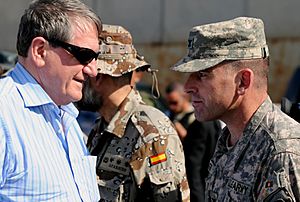
In January 2009, President Obama appointed Holbrooke as the special representative for Afghanistan and Pakistan (SRAP). This was a new role that Holbrooke had suggested. In this position, he worked to build relationships with Pakistan. However, his relationship with President Obama and Vice President Joe Biden was sometimes difficult.
Other Activities and Interests
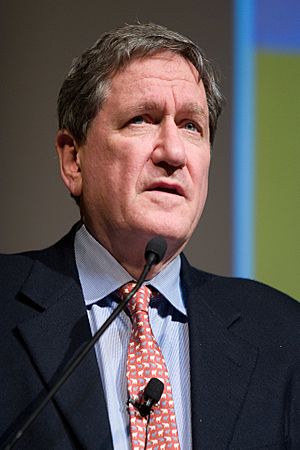
Richard Holbrooke was involved in many other organizations. He was the vice chairman of Perseus LLC, a private investment firm. He also served on the board of directors for American International Group and the Council on Foreign Relations. He was the founding chairman of the American Academy in Berlin and the chairman of the Asia Society.
Holbrooke was also a professor at Brown University, his old school. He wrote many articles and two books: To End a War and Counsel to the President. He also contributed to the Pentagon Papers. He received many honorary degrees. He wrote a monthly column for The Washington Post.
In 2007, he appeared on The Colbert Report television show. He acted as an "ambassador" to help mediate a funny disagreement between Stephen Colbert and Willie Nelson.
Personal Life
Richard Holbrooke was married three times. He had two sons, David and Anthony, with his first wife, Larrine Sullivan. He later married Blythe Babyak. His third wife was Kati Marton, whom he married in 1995. Before marrying Marton, he had a long relationship with journalist Diane Sawyer.
Death and Legacy
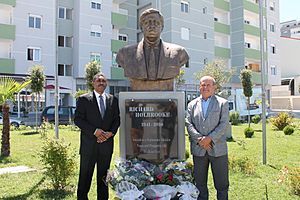
On December 11, 2010, Holbrooke became ill and was taken to the hospital. He had a serious heart condition called an aortic dissection. He underwent many hours of surgery.
Richard Holbrooke died on December 13, 2010, from complications of this condition. His last words before surgery were a joke with his doctor, saying: "You've got to end this war in Afghanistan." He is buried in Oakland Cemetery in Sag Harbor, New York.
President Obama honored Holbrooke, saying that "few have left such a towering legacy as a face of America to the world as Richard Holbrooke." A memorial service was held for him on January 14, 2011.
In 2015, Holbrooke's son, David, directed a documentary film called The Diplomat. It tells the story of his father's career and achievements. A street in Pristina, the capital of Kosovo, is named after him.
Recognition
In 1999, Holbrooke received the Golden Plate Award from the American Academy of Achievement.
In 2011, President Obama created the Richard C. Holbrooke Award for Diplomacy. This award is given each year to people or groups who have made special contributions to diplomacy.
Writings
Books
- To End a War. New York: Random House (1998). ISBN: 978-0375500572.
Articles
- "The Machine That Fails." Foreign Policy, vol. 1 (1970): 65-77. . JSTOR 1147889.
- "Japan and the United States: Ending the Unequal Partnership." Foreign Affairs, vol. 70 (1990): 41. . JSTOR 20045002.
- "America, a European Power." Foreign Affairs, vol. 74, no. 2 (Mar.-Apr. 1995): 38–51. . JSTOR 20047041.
Reports
- East Asia in Transition: Challenges for the Trilateral Countries: A Task Force Report to the Trilateral Commission. New York: Trilateral Commission (1998). ISBN: 978-0930503048. .
See also
 In Spanish: Richard Holbrooke para niños
In Spanish: Richard Holbrooke para niños
- Foreign policy of the Bill Clinton administration
 | Jessica Watkins |
 | Robert Henry Lawrence Jr. |
 | Mae Jemison |
 | Sian Proctor |
 | Guion Bluford |


